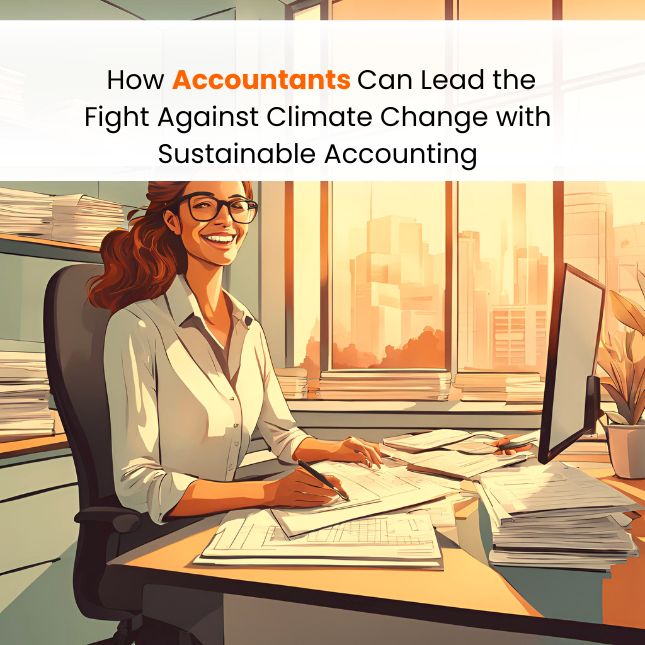OVERVIEW:
Accountants can play an essential role in the fight against climate change by following sustainable accounting practices. Accountants can use ESG (environmental, social, and governance) metrics in financial reporting to assess the company’s sustainability efforts, long-term viability and climate-change risks, suggestions on green investments, etc. Sustainability reports are beneficial in educating businesses and employees and promoting cost-effective practices, transparency, and eco-friendly initiatives. To learn more about the impact of sustainable accounting on climate change and the ways to mitigate it, read the article.
PROMOTING GREEN INVESTMENTS:
Accountants can advise their organization or client to go for green investments. They can make detailed reports about long-term benefits, potential rates of return, and other financial benefits that can be achieved through green investments. Creating financial strategies that maximize investors’ profit and help mitigate climate change is another sustainable accounting practice used by accountants. Green investments that accountants can suggest depending on the demand of the organization or clients are sustainable agriculture, renewable energy projects, eco-friendly technologies, etc.
INTEGRATING ENVIRONMENTAL, SOCIAL AND GOVERNANCE METRICS:
Another sustainable accounting practice to keep a record of the organization’s eco-friendly practices while maximizing profit is to incorporate ESG (environmental, social, and governance) metrics in the financial reporting of the organization. Through this practice, the organization can easily track carbon footprints, waste management, and resource consumption. Aligning their business activities with environmental sustainability helps them analyze where they are lacking and how can they come up with strategies to become environmentally responsible yet gain long-term business benefits.
SUSTAINABILITY REPORTING:
In sustainable accounting practices globally, one of the most important roles is played by sustainable reporting. Through sustainable reporting, accountants can demonstrate transparency and accountability regarding their business practices and environmental impacts. Accountants can also use frameworks like the Global Reporting Initiatives (GRI) to showcase a company’s efforts towards sustainability. These reports are the best way to communicate a company’s sustainability efforts and their outcomes (reduced environmental harms) to the stakeholders. This practice will not only increase your brand’s reputation but also create awareness among others to adopt sustainable business practices.
RISK MANAGEMENT:
However, now sustainability is considered one of the most important factors in many organizations but climate changes are drastically increasing and impacting businesses both directly as well as indirectly. Sustainable accounting also plays a vital role in protecting an organization from these climate changes by incorporating climate-related risk in the firm’s financial strategy ensuring the organization is financially prepared to face any climatic disaster. There are both direct impacts such as extreme weather conditions and indirect impacts like regulatory changes in carbon taxes, etc which need to be addressed while preparing a financial strategy for managing risk and productiveness for the future.
CARBON ACCOUNTING:
As the world is moving towards carbon pricing and carbon reporting regulations. The Accountants can also adopt carbon accounting to manage, assess, and measure a company’s carbon emissions. Carbon accounting is another sustainable accounting practice, it allows the accountant to assess and set carbon emissions reduction targets, track progress, and take care of international or local standards of carbon reduction.
ADVISING ON SUSTAINABLE COST MANAGEMENT:
Practically, the business aims to maximize its profit therefore, accountants can suggest sustainable cost management. This means identifying and proposing cost-saving opportunities that not only bring efficiency to the organization but also reduce environmental harm. Some of the ways organizations can maximize efficiency by being eco-friendly are minimizing waste, adopting sustainable supply chain practices optimizing energy use, etc. This is another sustainable accounting practice that is quite effective for both organizations as well as the environment.
SUPPORTING POLICY ADVOCACY:
Accountants have some strong financial expertise that they can use to influence or suggest policy changes regarding environmental regulations at the corporate as well as government levels. They can suggest better policies for climate-conscious business practices and strong environmental regulations. Accountants can make long-term financial plans aligning sustainable practices and shape a very strong sustainable economy.
EDUCATION AND AWARENESS:
Sustainable accounting practices can also include the foundational step to bring sustainability, this step is none other than educating and spreading awareness regarding the issue. Most businesses still don’t comply with sustainability or environmental regulations. It is high time someone needs to create awareness amongst people about the importance of sustainable business practices, their benefits for business as well as the environment and long-term gains. Accountants can demonstrate their financial skills to prove how this is not only about saving the planet but also about the long-term financial stability that it brings to the table.
CONCLUSION:
Sustainable accounting practices can play a vital role in bringing businesses or organizations towards eco-friendly business practices. As every business aims to earn as much profit as possible accountants know how to make good financial decisions. They can use this skill to create strategies or plans aligning sustainable business practices with maximized financial gain, and long-term profits. There are numerous ways accountants can lead the fight against climate change such as by suggesting green investments, incorporating ESG metrics, sustainability reports, carbon accounting, and advising on sustainable cost management, etc. Not to forget it is also extremely crucial to create awareness about sustainability and sustainable accounting practices in the corporate world.
FREQUENTLY ASKED QUESTIONS:
Q1: How can accountants contribute to climate change efforts?
Accountants can contribute to climate change efforts and implying sustainable practices by promoting green investments, carbon footprint emissions, transparency and accountability regarding carbon footprints, incorporating sustainable practices into financial reporting, etc.
Q2: How can accountants help companies transition to a low-carbon economy?
Accountants can help them transition to a low-carbon economy by suggesting investments in energy efficiency projects, and low-carbon technologies, evaluating the financial viability of sustainable initiatives, etc.
Q3: What are the benefits of sustainable accounting for businesses?
By implementing sustainable accounting practices business can enhance their reputation, risk mitigation, cost-effectiveness, long-term gains and access to capital, etc.





